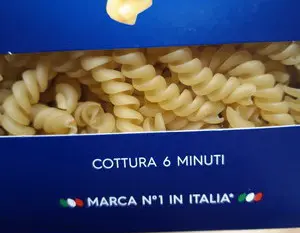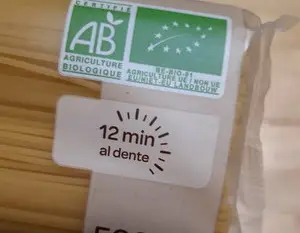This site uses only a few technical cookies necessary for its operation. By continuing to browse, you accept their use.
To find out more...
To find out more...
Cooking time for pasta

What is as good and simple as pasta? Not much, I think, and it's so easy to prepare: boiling water, salted (or not, depending on your taste), a few minutes of boiling and it's ready.
The only "difficulty", so to speak, is the respect of the cooking time and the risk of, unfortunately, overcooking your pasta.
The only "difficulty", so to speak, is the respect of the cooking time and the risk of, unfortunately, overcooking your pasta.
24 K 4.6/5 (19 reviews)
Keywords for this post:PastaTimeCookingAl denteItalyLast modified on: July 18th 2019
Cooking time for pasta
As always with pasta, we must take inspiration from the masters that are the Italians, they are very attached, and rightly so, to a rigorous and fair cooking, the famous "al dente".
Cooking is very precise: the pasta is plunged into boiling salted water and left for the precise number of minutes indicated on the packet, a number which depends on the nature of the pasta: 5, 6, 7 minutes or more, then drained and eaten or served.
Impossible to miss? In principle not, but there is a very easy mistake to make, it is to overcook, and thus to have overcooked pasta which becomes sticky, and much less good.
An Italian friend of mine pointed out to me that "At home" (in France) pasta is always overcooked, no matter where you go to eat it. It's not that it's inedible, just that it's a little overcooked, usually by a minute or so.
It's not always the cook's fault, the mistake is often already on the package, so she pointed me to this great tip.
Respect the time indicated precisely (here 6 minutes)
Subtract 1 minute from the indicated cooking time, so here 12 - 1 = 11 minutes.
With this simple rule, you should have pasta that is always al dente.
To sum up: The cooking time is indicated not in Italian on the package => subtract one minute from the indicated time, the cooking time is indicated in Italian, do not change anything.
Cooking is very precise: the pasta is plunged into boiling salted water and left for the precise number of minutes indicated on the packet, a number which depends on the nature of the pasta: 5, 6, 7 minutes or more, then drained and eaten or served.
Impossible to miss? In principle not, but there is a very easy mistake to make, it is to overcook, and thus to have overcooked pasta which becomes sticky, and much less good.
An Italian friend of mine pointed out to me that "At home" (in France) pasta is always overcooked, no matter where you go to eat it. It's not that it's inedible, just that it's a little overcooked, usually by a minute or so.
It's not always the cook's fault, the mistake is often already on the package, so she pointed me to this great tip.
If you have a package of pasta where it is written in Italian

Respect the time indicated precisely (here 6 minutes)
If you have a packet of pasta where it is written in a language other than Italian

Subtract 1 minute from the indicated cooking time, so here 12 - 1 = 11 minutes.
With this simple rule, you should have pasta that is always al dente.
To sum up: The cooking time is indicated not in Italian on the package => subtract one minute from the indicated time, the cooking time is indicated in Italian, do not change anything.
Lasts posts
XO Cognac Explained: Meaning, Aging, and Flavor Profile
XO Cognac always goes beyond the labels on the bottle: it is often associated with tradition and quality. You get to appreciate the artistry, character and ageing process when you understand what defines this smooth Cognac. The section below tackles everything about XO Cognac, from complex flavour...January 28th 2026824 Sponsored article
Butter vs. grease
We often read in a recipe where a pastry is put into a mould that, just before pouring, the mould should be buttered or greased. But what's the difference between these 2 terms?December 1st 20252,5535
Getting out of the fridge early
Very often when you're cooking, you need to take food or preparations out of the fridge, to use them in the recipe in progress. There's nothing tricky about this: you just take them out of the fridge and use them, usually immediately, in the recipe. But is this really a good method?November 24th 20251,6625
Who's making the croissants?
When you look at a bakery from the outside, you naturally think that in the bakery, the bakers make the bread, and in the laboratory, the pastry chefs make the cakes. It's very often like that, with each of these professions having quite different ways of working, but sometimes there's also one...November 23th 20251,500
Oven height
When we put a dish or cake in the oven, we naturally tend to put it on the middle shelf, and that's what we usually do. But in some cases, this position and height can be a little tricky, so let's find out why.October 8th 20255,0045
Other pages you may also like
Tranché, dissociated, failed, in short... missed!
When preparing a sauce or a cream, there's always a (small) risk that the creamy preparation you're working on will suddenly separate into two parts of different textures: a liquid part, for example, and a more or less solid part, or even become lumpy. It's terribly frustrating, but we'll see...June 19th 202314 K5
The color of the bread crumb
When you go to buy bread, at your baker's, at the time of the choice, if you hesitate of course, you will undoubtedly be very sensitive to the color of the crust, and you will be right. The color of the crust, from golden, to sometimes very dark, deep brown almost black, depending on the maturity...April 30th 202222 K4.6
Different kinds of pastry and dough
When cooking in general, and particularly in baking, we can make and use many different kinds of pastry and dough. All built on the same "base": flour - a powder to which we add fat, liquid or both to produce the dough which is then cooked. .November 6th 2012112 K 14.0
Cleaning endives
If you buy your endives elsewhere than in supermarkets, and in this case the best is of course from a market gardener, he or she is the one who planted and harvested them, in this case you will have endives full of earth or sand, depending on where they were grown, which is normal and reassuring, we...March 24th 202027 K4.6
Divide and weigh dough into regular pieces
When you prepare dough for cupcakes in a pastry shop or bakery, at some point you're going to have to divide it, i.e. cut it into small pieces, which should all have the same weight. Sounds simple enough, but is it really that simple?May 30th 202312 K5
Post a comment or question
Follow this page
If you are interested in this page, you can "follow" it, by entering your email address here. You will then receive a notification immediately each time the page is modified or a new comment is added. Please note that you will need to confirm this following.
Note: We'll never share your e-mail address with anyone else.
Alternatively: you can subscribe to the mailing list of cooling-ez.com , you will receive a e-mail for each new recipe published on the site.









